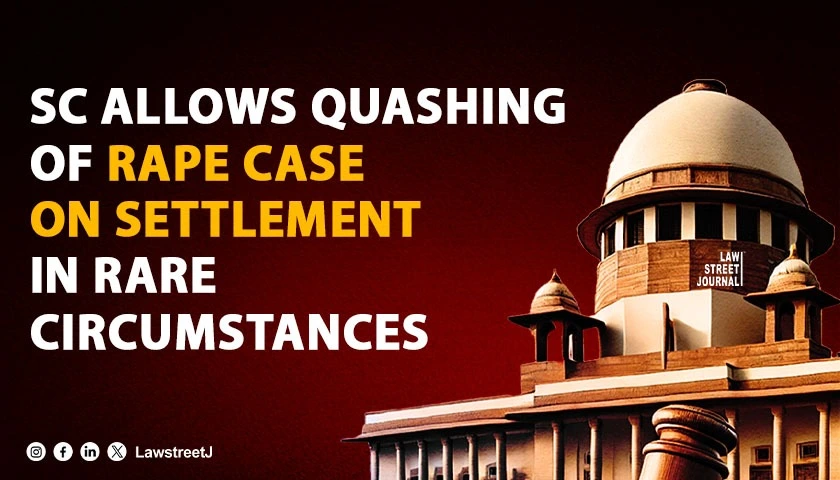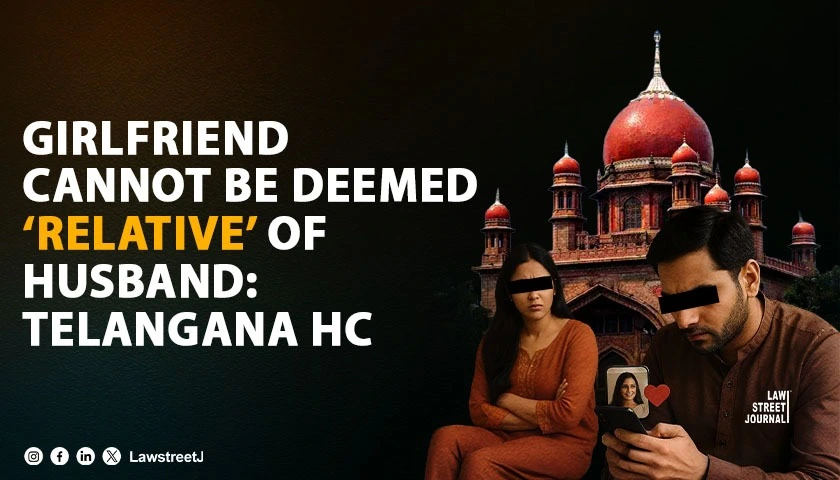New Delhi: The Supreme Court has delivered a significant judgment allowing the quashing of criminal proceedings in rape cases based on a settlement between the parties, emphasizing that such decisions must be made with reference to the specific facts of each case while recognizing the grave nature of such offences.
Justice Vikram Nath, writing for the bench that also included Justice Sanjay Kumar, made observations on the court’s power under Section 482 CrPC to secure the ends of justice in exceptional circumstances involving serious offences.
The court was hearing criminal appeals challenging the Bombay High Court’s refusal to quash the criminal proceedings. Addressing the nature of the case, the court observed: “FIR bearing Crime No. 304 of 2023 dated 21.11.2023 was registered under Sections 376, 354-A, 354-D, 509, and 506 IPC against the appellant, containing grave allegations including sexual assault and criminal intimidation. It was alleged that he had sexually exploited the complainant over time, recorded videos of the act, and interfered with her subsequent matrimonial alliances.”
The court highlighted the unique circumstances that led to the settlement, stating: “In March 2024, the complainant in the second FIR filed an affidavit before the High Court expressing her desire not to pursue the prosecution and stating that she had no objection to the grant of bail to the accused. She further affirmed that the matter had been amicably resolved and that she had received ₹5,00,000 towards marriage-related expenses.”
In a critical observation on the judicial approach to such cases, the court stated: “At the outset, we recognise that the offence under Section 376 IPC is undoubtedly of a grave and heinous nature. Ordinarily, the quashing of proceedings involving such offences on the ground of settlement between the parties is discouraged and should not be permitted lightly. However, the power of the Court under Section 482 CrPC to secure the ends of justice is not constrained by a rigid formula and must be exercised with reference to the facts of each case.”
The court emphasized the contextual nature of the allegations, noting: “We are confronted with an unusual situation where the FIR invoking serious charges, including Section 376 IPC, was filed immediately following an earlier FIR lodged by the opposing side. This sequence of events lends a certain context to the allegations and suggests that the second FIR may have been a reactionary step.”
Regarding the complainant’s current position, the court observed: “The complainant in the second FIR has unequivocally expressed her desire not to pursue the case. She has submitted that she is now married, settled in her personal life, and that continuing with the criminal proceedings would only disturb her peace and stability.”
The court highlighted the consistency of the complainant’s stance, stating: “Her stand is neither tentative nor ambiguous. She has consistently maintained, including through an affidavit on record, that she does not support the prosecution and wants the matter to end. The parties have also amicably resolved their differences and arrived at a mutual understanding.”
Justifying the decision to quash the proceedings, the court noted: “In these circumstances, the continuation of the trial would not serve any meaningful purpose. It would only prolong distress for all concerned, especially the complainant, and burden the courts without the likelihood of a productive outcome.”
The court emphasized that both parties had taken a categorical stand, observing: “Both parties have categorically stated before this Court that they have resolved their disputes amicably and are desirous of moving on with their lives. The complainant in the second FIR, now married and residing with her husband, has expressed that continuation of the prosecution would cause further disruption in her personal life.”
In its final determination, the court stated: “Having considered the peculiar facts and circumstances of this case, and taking into account the categorical stand taken by the complainant and the nature of the settlement, we are of the opinion that the continuation of the criminal proceedings would serve no useful purpose and would only amount to abuse of process.”
The court allowed the appeals and set aside the High Court’s order, stating: “The impugned order of the High Court dated 07.03.2025 is set aside. FIR No. 302 of 2023 and FIR No. 304 of 2023, along with all proceedings arising therefrom, including Sessions Case No. 29 of 2024, stand quashed.”
The judgment underscores that while rape cases are serious and non-compoundable, the court’s inherent power under Section 482 CrPC permits quashing in exceptional circumstances where the continuation of proceedings would serve no meaningful purpose and only cause further distress to the parties involved.
Case Title: Madhukar & Others vs. State of Maharashtra & Another; Prabhakar vs. State of Maharashtra & Another













